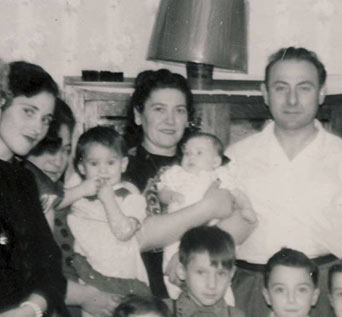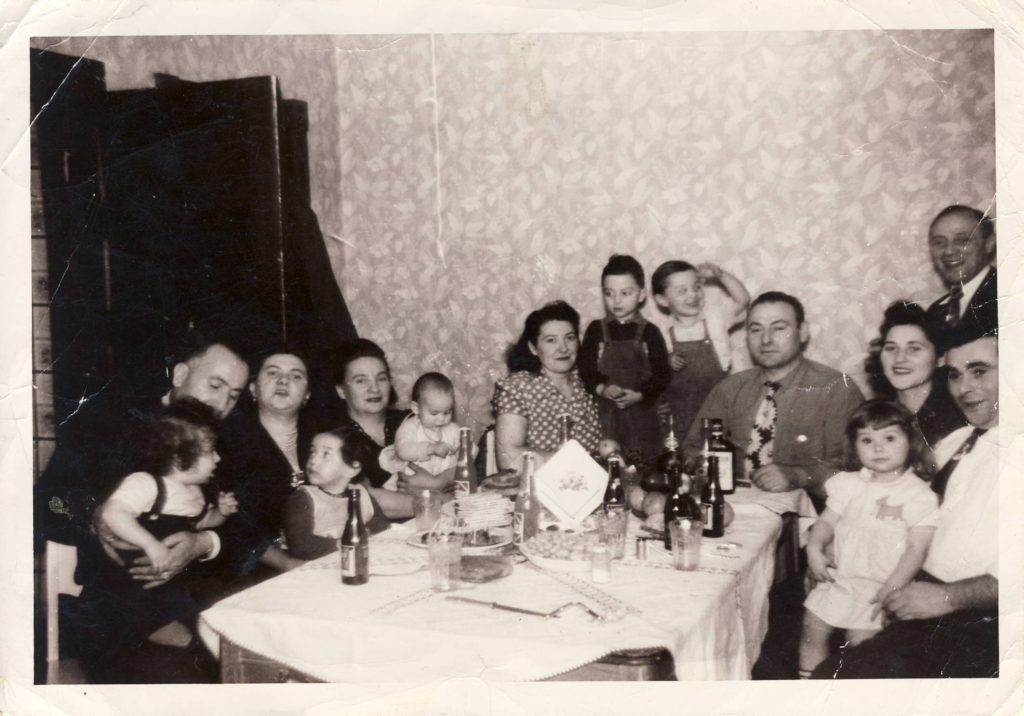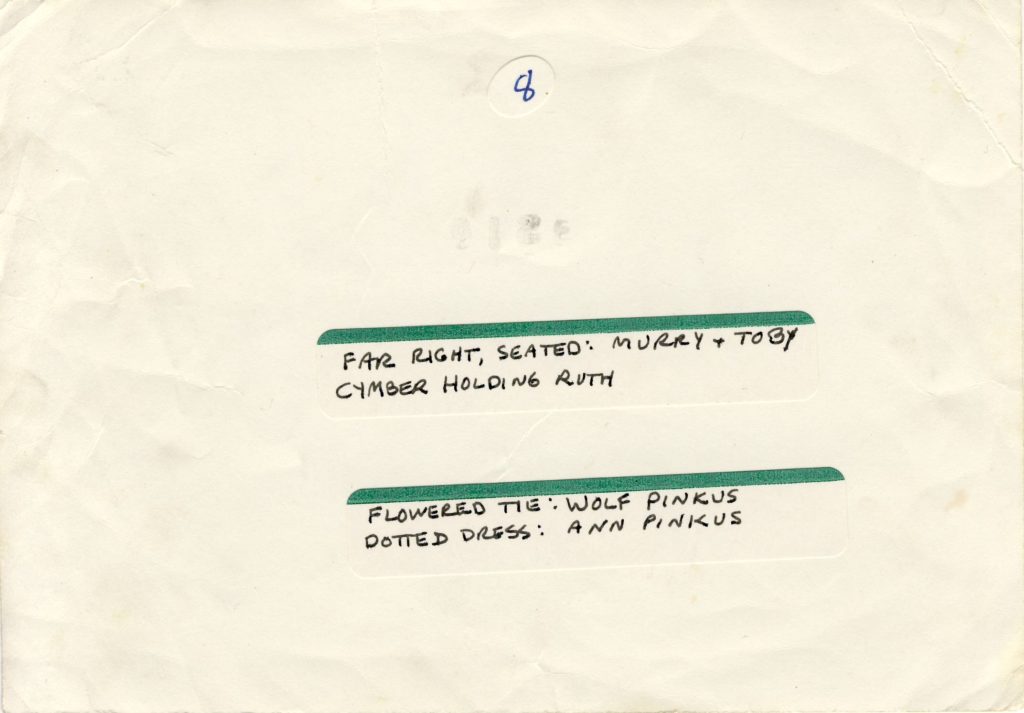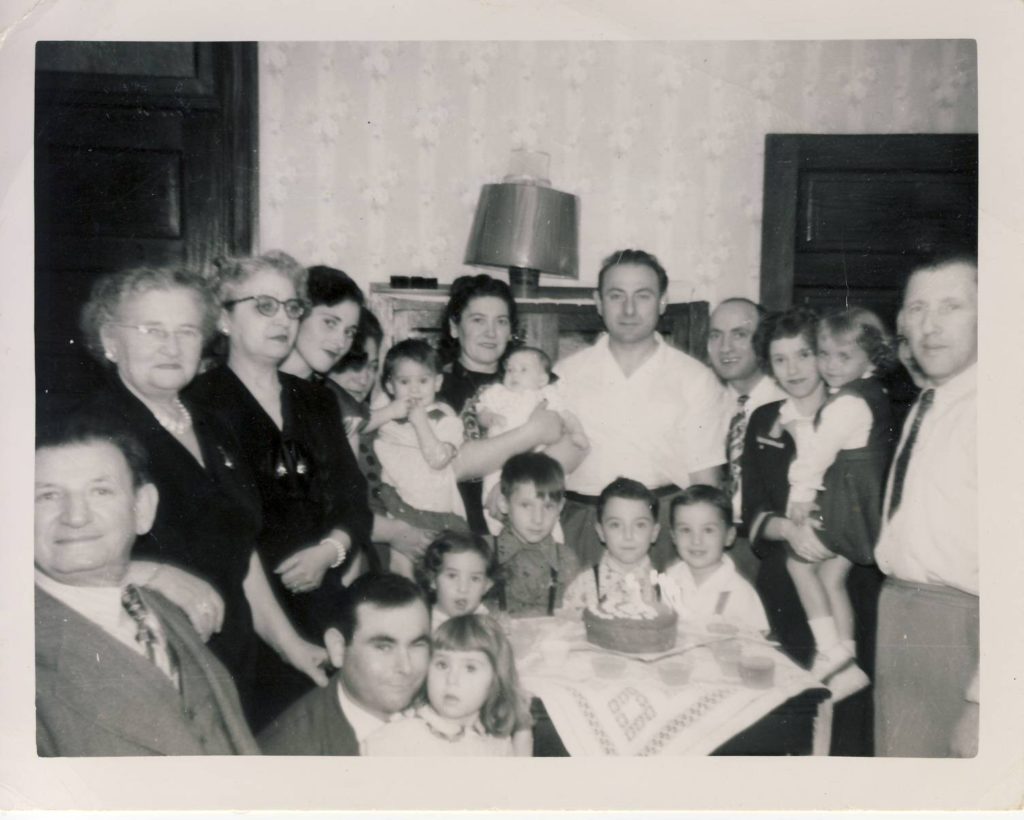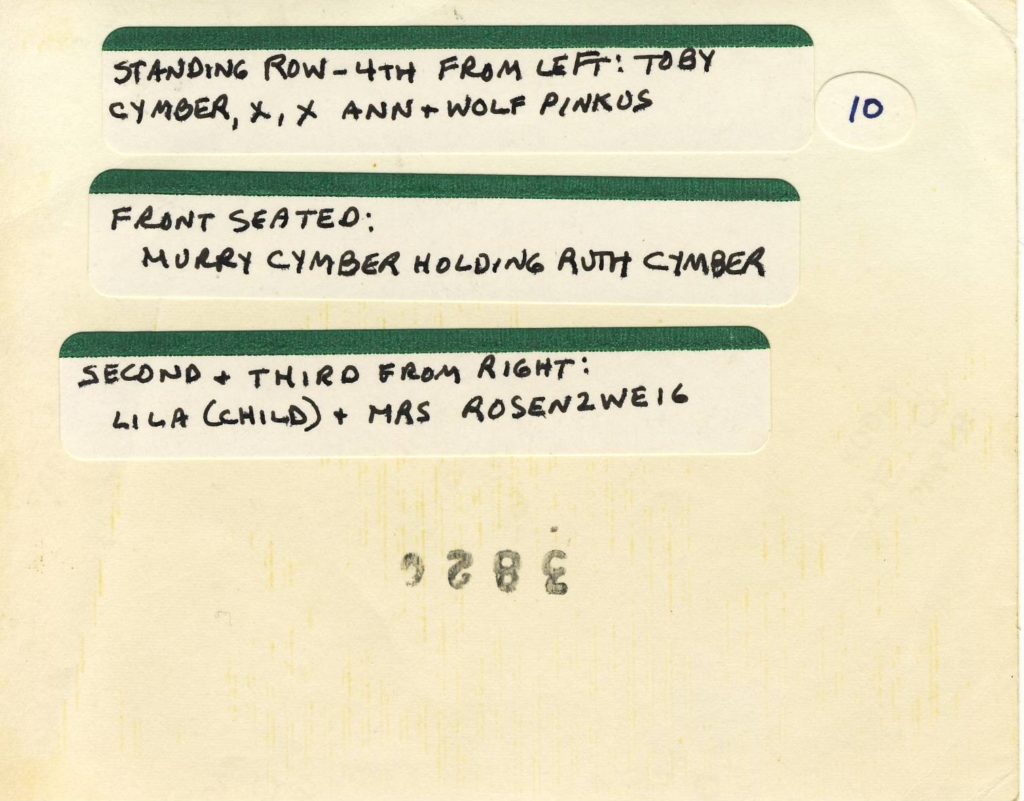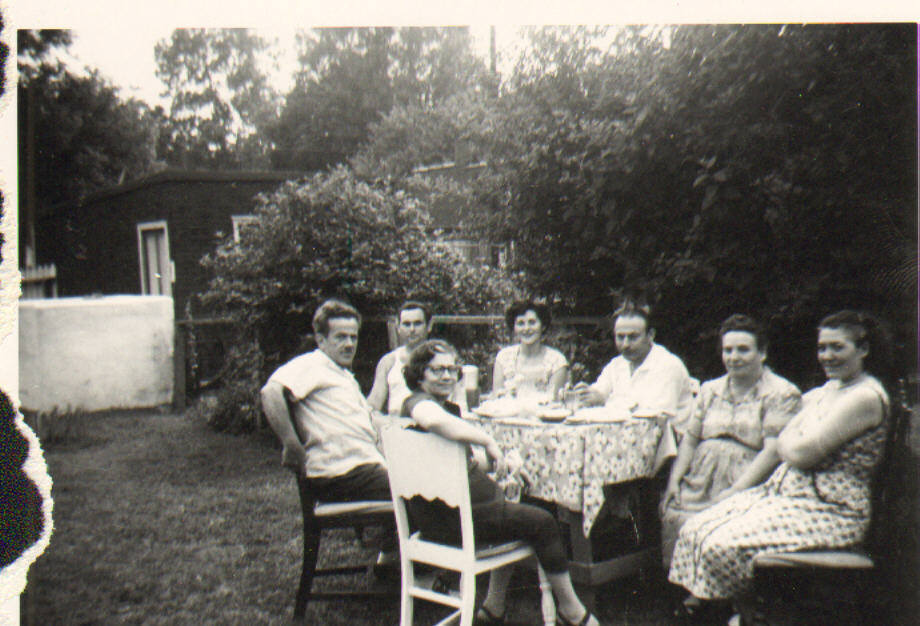YOUNG: June 16 – 17. Okay, we got stopped, so…
PINKUS: Each morning was men came to search in each barrack, but during night people died. Each day, each night, people were dead. Next to me – I was sleeping with one and I was talking with her. She didn’t answer and I – she was dead. So they were picking up each morning they picked up those, those bodies. And you can understand how this, how this was – like, people come each morning, if you are in a hotel, to clean up, to pick up the dirty laundry. They picked up the bodies from each barracks from the, in the – from the beds, wherever the body was laying on the floor, or on the bed, or wherever. And sometimes you were sitting on the bench and they died. So, I’m goin’ back to – when they left us and they run away, those Germans, the Gestapo, the Obershaftsfuhrers, the officers, the, this was people what they were watching us, they ran. I got sick. I remember I couldn’t function anymore. We were sitting outside – not – we don’t have anyplace. We are sitting like, like in the appel place – just, just outside, on the field we’re sitting. Was around barracks, but we wasn’t there. I felt I was very sick, was bombed this place, but I couldn’t function. I thought to myself – I was still conscious, but looks like I had high temperature. I closed my eyes and I thought to myself, “What’s the difference – or I will be killed from their hands or from the bombs.” I was sick. Where will I run? There’s no place to run. And I was sitting there and later on I woke up, dear God. This came to me back like I would be days or years ahead from the bombing. ’Til I woke up, I was sitting on a cement floor with a lots of people around, what they were sick too. They had those typhus. I open my eyes and I looked around and I remember a woman was walking, and I said, “What is this? Where are we?” She said, “We are going to a hospital. You all are sick.” And this was already a Russian rule. This time we were liberated, and I don’t even know because I was unconscious. How long this took, when I was sitting outside on this appel place ’til I woke up in the basement, I don’t know how long this took because I was sick.
YOUNG: Did you have typhus, or was…
PINKUS: Yes, yes. To the end of the liberation, I become this disease and she was saying in Russian, but if you talk Polish, it’s resembles, and I knew what she was talking. I didn’t know much, but this she said in Russian. “We are bulnya,” is sick. (SIGHS) So, they took us and again I passed out and I didn’t know anything. From this basement to being on the wagons, the way to the hospital, this was everything happen in Poland. I, again, opened my eyes and I saw Russian soldiers. One is driving this horse and one is sitting next to him and were four women in this wagon. Couldn’t fit in anymore. And again I ask, “Who are you, what are you doing with us?” And they said in Russian, “We are the Russian soldiers. We are taking you in a hospital. You are sick.” We arrived to this hospital and this hospital, this particular town called Koshjajina in Polish, Koshjajina. This only thing what I can remember. They took me to the bathroom, they gave me a bath and start shaving my hair, and I put the hand on my head. I said, “My God, I had already pretty nice hair grown back from this time what they shaved when I arrived to Auschwitz, ’til now. And again, she is shaving my hair.” We were full of lice and a mess. She said, like a baby, she said, “Baby, don’t cry. We have to do that.” So, I don’t have any choice. She said, “You have a lots of lice and we have to clean you up before we putting you in bed.” So, she sprayed some powder on me and I was in this hospital. They put, and later on was a Jewish, a Russian Jewish doctor. They put all the Jews in one room – men, women – all in one room.
YOUNG: Um-hmm.
PINKUS: And I was there for weeks – I don’t know. I didn’t know nothing. One time I woke up and I saw my sister in the dream, but to me this seems to be so natural that this happened to this particularly day. She was giving me eggs – two eggs. She gave me and pulled back – she giving me and pulled back her hand. I said, “Kayla, you won’t give me? It’s okay if not, just don’t tease me. I’m hungry. Give me this egg. Don’t tease me anymore.” The rest of the people, when I wake up, they was telling me what I was talking and I remembered what I was talking about. And this was a dream and I thought I woke up. Took maybe a half a day later, I woke up and I was looking around. I still thought I am with those Germans. The fear is still, it’s fresh and it’s unbelievable. And I asked the bed next to me, was a woman, and I said, “Can you tell me what’s goin’ on here. What is here?” She said, “You don’t even know what’s goin’ on here?” I said, “No.” “This is a hospital. We are all Jewish people here.” And those people are better already. They eat and they were alert. They even start walking around. And she told me all about this the doctor is a Jew. And then I saw men. And I said, “We are with the men here too? It’s not enough the Germans took away our pride and now we are here. God knows, maybe I was uncovered or what.” She said, “Child, it’s not the way as you say. He is taking good care of us and it’s a wartime. It’s not pride now here. We have to live. We have to survive. Never mind about the pride.” She was very smart. She was a little bit older than I was. Maybe she made more sense than I did.
And after this when little by little and after this typhus when you start getting better, you are very hungry. It’s no way that you can be full, you have enough something. And you are tired and hungry, tired and hungry. And this took, maybe about a couple of weeks and I start walking around to wash myself. And we helped each other. I washed the other one, the other one washed me. In a dish with water with soap. We don’t have any washrooms there or what. And one day the doctor came in and he said, “Listen girls, in a way it’s bad news, in a way it’s good news. You have to leave the hospital.” To us leave the hospital was like – what will we do? Where are we going now? In a way we are sick. We start all crying. He said, “I’m sorry, I don’t have any other choice. This hospital is a release. We have to give up the building.” This was – this hospital was not a hospital. Was for the military, is like up here in Missouri – the…
YOUNG: A barrack?
PINKUS: Yes – no was not a barrack, was a house, but was for military, this house. We have to move, he said, “You have to leave.” So we left – eight girls, we left. We asked instructions where to go to the train, so people showed us but farther until the train we couldn’t walk anymore and this was in March. In Poland March is very cold. Was a rainy day, foggy, cold. So we came to those particular train station, looking at this train with thousands and thousands of people around, on the roof, inside, people are holding from outside and inside is no way. So, we thought we will lay down. We couldn’t even – was coffee free. They was given us coffee free. Nobody could even reach the coffee, stay in the line and take some coffee. So we, all eight of us, we lay down on one pile this we should keep warmer and we are laying like this on the concrete. We were used already to it. We could sleep on the concrete. And each of us had a pot – was a good pillow to put under the head. And we are laying like this and came a man and say in Polish language, “Girls, what are you doin’ here?” I raised my hand. The other girls were not from Poland, they were from Czechoslovakia, from Yugoslavia, from all over but not from Poland. And it was very hard. They understood some words but was very hard to talk Polish. So I told him what’s the reason we are laying here. I said, “Can’t you see, we just left the hospital. We are after the typhus, disease. We are so hungry. We are cold. We are weak. We couldn’t – we want to go to Lodz and it’s impossible for us – how?” He said, “Just sit down. Don’t lay. Just sit down. Don’t lay on the concrete – you will get sick.” Just an angel from the sky, God just send him. ’Til this day, I couldn’t realize that this was a man. So we stand up as much as we could and this man go over there to this – and he said, “Girls, come with me.” We went with him and we were staying four and four. Was not much place, was lots of people around. And he had a big speech in Polish. He was a husky, tall man and he said, “People, ladies and gentlemen, I have an announcement to make and listen, listen…everybody…and listen good. You see here those eight girls? They are sick. They have typhus and if you want to rescue your life, just move. They are goin’ in the train and this is very contagious. Whoever will stay next to them will get sick.” And everybody moved away (CHUCKLES) and we had the place to go in the, in the train, inside. Isn’t that a miracle? He was goin’ with us to Lodz. We came on the station at Lodz. Was a beautiful station there, that train station. To us it was everything like we would come from the wilderness, from a different planet. We saw a clock. “Girls, we have a clock here.” A woman had lipstick. “She has a lipstick, she wears a purse. Oh, it’s a baby. She has a baby. There are some men around here.” We were wild. We didn’t know – like we were out of touch from the reality, like we would be living not in this world anymore.
YOUNG: Hmm.
PINKUS: And the man again. He said, “Sit down with benches, sit down.” He brought us a soup. The soup was sort of – I still can feel the taste of it. And he brought us white bread. A lots of slices of bread. And we could eat as much as we wanted. And he had a speech for us, “And now, girls, you have to be on your own.” He gave us, everyone, five zloty. I said, “No, you did so much for us, you rescued our life. We would be there dying on those concrete. We don’t have any choice to come in in the train and now money you are giving us? It’s too much.” He said, “Listen, here is a normal life already. You don’t have here anything for free. You will go with a streetcar…”
YOUNG: Trolley?
PINKUS: Yeah. “…you have to pay. Its not much here, five zloty,” he said. “Five zloty is not much.” So he gave us all. So I took an address, his. I said, “From where are you?” He said, “From Krakow,” and he gave me his address, and I lost this. I said, “When I will straighten out myself and I will have money, I will send you back.” And I lost those particular address, and this was so important to me. And he walked us to the streetcar. He talked to the driver, “Let them out, was there like, the city hall to register who you are and where you come.” It’s called a Gemeine. We came, and he said, “Over there is a Gemeine and let them out by this building.” “They come from there and here and there,” they explained to this driver everything. He was very cooperative, very nice and we came to this place. We registered, each one from where we are and the names and everything. And in the meantime they gave us a coupon. It’s called a talon – a coupon for food. We go with this coupon – we went to a store, we got some food – bread, jelly, some brown sugar – not much – just to keep alive. (LAUGHTER) And we are already in Lodz now. Those rest of the girls, they went there too and they decided they will try to go back to the train station and go to their home places from wherever they come.
YOUNG: Uh-hmm.
PINKUS: And I left there. So I decided I will go where we used to live in ghetto in Lodz. Everything was destroyed when I came over there, burned. When they took out all – when the ghetto was empty, no more people – they burned the whole ghetto. And there was in this particularly little house was so many memories, and I was looking in the yard. We took out those rocks and made a garden, plant some vegetables to eat, whatever we could – cabbage, carrots, broccoli, whatever we planted there – beans – to have something to eat. This was still, those garden was still in and I could see when my husband was digging those rocks and he was sweating and I was helping and here and there, and those steps what lead us in the house were still not burned because it was cement. I was sitting on this little steps and this for me was the third world war to go through. I was crying and I thought to myself, “Where should I go now, to whom I belong now?” I start screaming, screaming to God, “Why I’m alive?” I was in so many dangerous places, couldn’t I die with the rest of the people, not to go through now what I am goin’ through. And I walked and I walked and I came back to this particularly place like the city hall and I was looking around. Like here’s a window what you already think and here’s a wall. Everybody who came was signing their name. And I was looking around. I signed my name too. Maybe somebody from my relatives will come and will see my name from where I come.
YOUNG: So this was a place where all the refugees were gathering?
PINKUS: Yes, yes, yes. They are all survivors come to this place in Lodz. So I wrote down this name before in form, they call me Anja Lipshitz, maiden name is Pelta. I am from Wielun, whoever comes. And still, address unknown. I still live, I was on the steps. I live on the steps (LAUGHTER) and whoever comes, I looked at them, “Maybe it’s my brother, maybe it’s my cousin, and maybe it’s my husband.” Everybody I was looking in the faces and start questioning – no success – nothing. Finally, a few days later – everyday I was reading. Everyday was more signatures on this wall. I start searching, reading those. I found two sisters what I was with them in Stutthof, in this krankenstube.
YOUNG: Uh-huh.
PINKUS: This one sister was sick. She lost from her legs the toes. And they had an address, and I went there, and from then on I was living with them. And we start selling some – we had to make something, a dollar, to live on it and the younger sister was very business-like.
YOUNG: Uh-hmm.
PINKUS: I said, “What to do, we need some money.” She said, “We start selling some pastry – bread, rolls, sweet rolls.” So we were carrying those to the houses, second floor, third floor, what was very, very hard work to get out from bed about three – four o’clock in the morning, go to the bakery, buy some stuff and carry in the houses. But we did it and in the meantime, we did this for a long, long time, I bought myself a dress, a pair of shoes now to walk in. I was still walking in those concentration shoes and the coat I had with the cross, the Red Cross, on the back, a black coat and a red cross on the back. I bought myself from this used things. Was a lots of used things in those towns. And one time I’m walking in the street and I met four sisters. With one I worked in ghetto Lodz and with their mother I worked with them in this factory. And we were hugging, kissing and crying each other and I ask them, “Where are you, where do you live?” They had some place just temporarily and I told them where I lived. We had a big place. We had about five rooms. So, I told them to come up there. They could cook some meals and if not they can live there, but really the apartment belonged to those two sisters, not to me. But I intervene – maybe they will let them – but, they just cook their meals there. But, anyway, they – one sister, the oldest from those four sisters, she said, “I have a good man for you. Maybe you ought to marry.” I said, “You are out of your mind. I’m still searching for my husband.” And this time, when I came home, I told you I met my sister-in-law, my ex-sister-in-law, my first husband’s brother’s wife in the concentration camp. She was giving me coffee.
YOUNG: Yeah.
PINKUS: And this time she already worked in Lodz in a delicatessen place. And she didn’t told me this. She knew this, my husband is dead. At night I met both of them. My sister-in-law had a sister. They kept the secret from me and those, her sister, she said – the sister’s name was Etta and my sister-in-law’s name was – Lotta was the sister’s name, Etta was the sister-in-law’s name. And Lotta say to Etta, she said, “Etta, it’s enough, we have to tell her the truth. Why she has to sit there day and night and look and search for him. He is not alive anymore.” This was their brother and Etta’s husband and my husband. Those three went together to death. From then on I was hysterical. In a way…
YOUNG: Why did they keep it a secret so long?
PINKUS: This what I was angry at them. I said, “I was torturing myself, I was sitting there day and night and looking and looking for what, and you knew that. But it happened. I – we keep – and then I’m going out to those four sisters. They said, “We have a man and you would remarry, you are young.” I said, “How can you talk about this, how can I start from beginning.” I felt I am an old lady. I felt I am hundred years old. I said to them, “Marry now at my age?” They said, “What do you mean in your age? We are older than you are.” I was this time 29 years old. I considered myself I am very old. But, anyway she said, “Why don’t we go” – they were not exactly from Lodz, they were from Piotrokov, was 40 kilometer away from Lodz. And they said, two sisters, they said, “We are going for the weekend to Piotrokov, come with us.” I said, “Okay, why not, what do I have to lose?” And I, over there, I met my husband – I met my husband. I thought I have the picture of here. And my husband now, Wolf Pinkus. He also lost his wife and three children in the gas chambers. And the one from those sisters what she was with us, she was engaged to my brother-in-law.
YOUNG: Uh-hmm.
PINKUS: This is one from the four sisters. Now she is my sister-in-law.
YOUNG: Yes, uh-hmm.
PINKUS: This is my husband’s brother. This is my husband. They are brothers.
YOUNG: I see. So she introduced…


